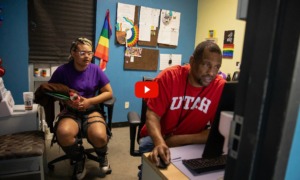 Dani Harris is a site leader at an after-school program in the Des Moines (Iowa) Public School District. She is known by her colleagues as a compassionate employee who works endlessly to ensure that her after-school students are safe and successful, and that their emotional needs are met. How does she do that? She has a deaf student and has taken it upon herself to learn sign language to communicate with her. On many, many occasions she has used her personal money and time to buy boots, hats, food and other items for her students. She attends her students’ activities outside of program time and has driven families — on her own time — to appointments to ensure their children have health care, all while being a wife and full-time mother of three.
Dani Harris is a site leader at an after-school program in the Des Moines (Iowa) Public School District. She is known by her colleagues as a compassionate employee who works endlessly to ensure that her after-school students are safe and successful, and that their emotional needs are met. How does she do that? She has a deaf student and has taken it upon herself to learn sign language to communicate with her. On many, many occasions she has used her personal money and time to buy boots, hats, food and other items for her students. She attends her students’ activities outside of program time and has driven families — on her own time — to appointments to ensure their children have health care, all while being a wife and full-time mother of three.
At the National Afterschool Association we are fortunate to know and hear about thousands of afterschool professionals – like Dani – who go above and beyond every single day in service to children and families in their programs and their communities. Afterschool Professionals Appreciation Week gives us the opportunity to share these stories of individual inspiration, while also advocating for the profession and the important role these professionals play in the development of children.
The role after-school plays in communities across the country has changed during the past decade. Years ago, first aid qualification and an interest in working with kids was professional preparation for staff at drop-in homework help and enrichment programs. The quality standards and assessment tools adopted by 30 states demand a workforce with different knowledge, skills and experience. After-school practitioners must be able to form supportive relationships with young people, plan and manage project-based learning, report and analyze student progress data, and be knowledgeable of community supports available to the families they serve.
Along with increasing demands like those outlined above, our field still battles many misperceptions about our profession and those who work in it. When describing the workforce, after-school researchers and advocates often say it is part-time, young, underpaid and temporary. They paint a picture of staff not much older than the program participants — individuals working in after-school as a way to gain experience for future careers in education, social work, counseling or other youth-serving fields. We now know this is not the case.
In 2013, the National AfterSchool Association conducted a survey of its members to test these assumptions about the pay, experience level and education level of those involved in the after-school industry. The survey shattered conclusions, demonstrating the after-school workforce has higher levels of education, more longevity in the field and are better compensated than previously reported. Survey findings include:
- 34 percent have a master’s or doctorate degree, and 11 percent have completed some postgraduate work;
- 39 percent have been with their current employer for more than 10 years;
- 47 percent have been in the after-school field for more than 10 years;
- 70 percent are salaried employees, and
- 45 percent are required to obtain at least 16 hours of continuing education/professional development each year to maintain continued employment.
Afterschool Professionals Appreciation Week allows all of us to counter these misconceptions with facts and figures that support the message that the after-school profession is a vibrant, growing and valued part of the education workforce. It also brings attention to the amazing work underway across the country to strengthen and sustain our workforce as we seek to deliver high-quality after-school experiences to young people.
Expectations for after-school programs are high. Increasingly, education reformers point to the potential of after-school and summer programs to close achievement gaps, increase third-grade reading proficiency and improve community outcomes. These expectations it turns out, are realistic: Each month it seems more evidence and research confirms the power of after-school programs. The industry will not, however, be able to sustain these outcomes without quality programs staffed by highly qualified professionals.
So, please join us this week in recognizing and thanking after-school professionals — like Dani and thousands of others — for the amazing work they do every single day.
Gina Warner serves as president and CEO of National AfterSchool Association. To learn more about NAA membership benefits and to join, please click visit naaweb.org/membership-information-page.

























